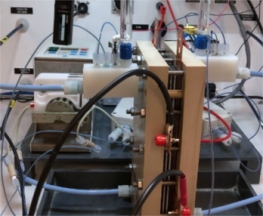The division Chemical Technology bridges the gap between scientific knowledge in chemical and biotechnological research and the practical application in engineering. This research area represents one of the core aspects of the DECHEMA, and has therefore been a very important element since the institute was founded.
The division consists of five teams which work closely together on their individual research topics

Mankind faces huge challenges concerning sustainable supply with energy, water and raw materials.
The research team applied electrochemistry is concerned with electrochemical processes for energy storage, water treatment and recovery of raw materials.
In the energy sector the team focusses on flow-batteries, monitoring their state of charge and developing electrolytes and electrodes. For electrochemical water treatment the contaminants, e.g. pharmaceuticals, are degraded by advanced oxidation processes at boron doped diamond electrodes. The recovery of raw materials is based on electrochemical dilution and precipitation of metals.
Competences

The R&D activities of the Energy Storage & Conversion team focus on the development of catalysts and electrode materials for fuel cells, batteries and electrolysers which include powder synthesis, ink & paste formulation, electrode coating and testing in laboratory cells. Our expertise lies principally in development of active and stable catalysts and intercalation materials for the PEM & High-Temperature Solid Oxide Fuel Cell (PEMFC / SOFC) as well as for Al-ion & Zn-ion (AIB / ZIB) batteries. Recently, we started to work on new research topics such as electrochemical Platinum recovery as well as identification of degradation mechanisms in alkaline (AEL), acidic (PEMEL) and high-temperature electrolysers (HTEL). A broad range of physico-chemical and electrochemical methods and instruments are available for investigation for R&D research and contracting projects:
Selected methods& facilities


Light-driven chemical reactions represent a sustainable method for a variety of applications. They often open up novel possibilities which cannot be reached straightforward with classical methods. For example, air and water can be remediated and cleansed from pollutants, organic synthesis can be conducted under mild conditions or light energy can be stored in chemical form like hydrogen or batteries. Furthermore, photon-driven processes can also be combined with biological catalysts enabling highly selective reactions.
The researchers in the Photocatalysis team develop novel photon-driven processes and try to understand them to be able to optimize them properly. The main goal is to utilize the light energy optimally, either in form of sunlight or efficient artificial light sources. Besides the development of novel methods, the focus lies on intensification and scale-up of the processes.
The key research topics of the group are:

In the sustainable electrochemistry research team, scientists are working on technical solutions for sustainable resource and energy management. In this context, the development of alternative raw material sources such as CO2 as well as the extended recycling of materials and energy flows as well as alternative synthesis routes is addressed electrochemically.
The focus is on methods for electrochemical gas utilization (e.g. CO2 reduction or CH4 oxidation), the development of catalysts and electrolysis cells, water treatment and analytics as well as the combination of electrochemical methods with biotechnological processes in bioelectrochemistry.
Selected Methods
Did our research topics spark your interest? Or can we support you with our comprehensive analytical methods? Take a look on our services site and do not hesitate to contact us.
Assoc. Prof. Dr. Jonathan Bloh
Telephone +49 6172 89938-387
Telephone +49 6172 89938-633
Dr.-Ing. Jean-François Drillet
Telephone +49 6172 89938-476
Assoc. Prof. Dr. Jonathan Bloh
Telephone +49 6172 89938-387
Telephone +49 6172 89938-642